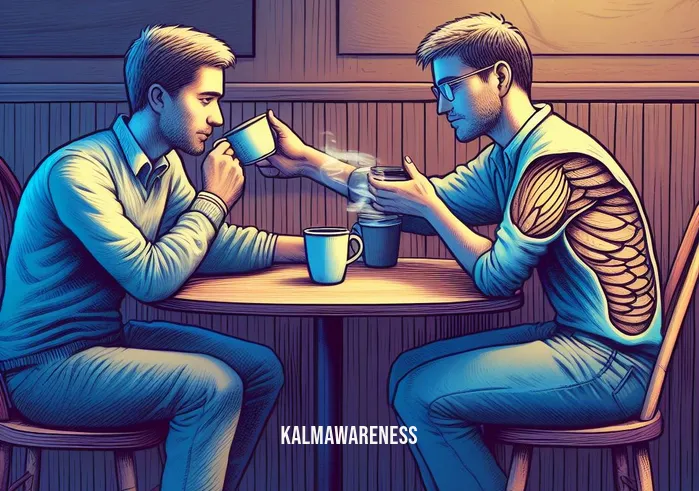Shedding the Weight of Resentment: Starting Your Journey
Ever felt like you’re carrying an invisible burden, a lingering sense of bitterness or resentment? You’re not alone. This feeling, often described as having a ‘chip on your shoulder’, can weigh heavily on your mind and spirit. But fear not – embarking on the journey to shed this weight is both liberating and transformative.
Understanding the ‘Chip’
Let’s dive into understanding what it means to have a ‘chip on your shoulder’. It’s more than just a fleeting annoyance or irritation. This metaphorical ‘chip’ represents deep-seated grudges, long-held resentments, or persistent feelings of injustice that burden your heart. Recognizing its presence is the first step in learning how to get rid of a chip on your shoulder.
The Roots of Resentment
To tackle this chip, we must understand its roots. Often, it stems from past experiences where you felt wronged, undervalued, or overlooked. These experiences leave emotional imprints, forming the basis of this lingering resentment. It’s important to acknowledge these feelings without judgment. As stated in “How People Change”, understanding the origin of our emotions is crucial in the process of personal transformation.
The Power of Mindfulness
Mindfulness can be a powerful tool in addressing the chip on your shoulder. It involves being present in the moment and observing your thoughts and feelings without getting caught up in them. Through mindfulness, you can start detaching from these negative emotions. The article “What are the Three Components of Mindfulness?” offers great insights into practicing mindfulness effectively.
Shifting Perspective
A significant part of getting rid of the chip involves shifting your perspective. It’s about moving from a mindset of victimhood to one of empowerment. This shift doesn’t invalidate your experiences but allows you to see them in a new light. Embracing a perspective of gratitude, as discussed in “Gratitude Method: Shifting”, can significantly alter your emotional response to past grievances.
Embracing Forgiveness
Forgiveness plays a pivotal role in this journey. It’s not about condoning what happened or forgetting it, but about releasing its hold over you. Forgiveness is a gift you give yourself, as highlighted in “Forgive, Forget, Move On”. It’s a conscious choice to let go of resentments, thus removing the power they have over your emotional well-being.
Making Peace with the Past
Finally, making peace with the past is essential. This doesn’t mean you have to be okay with what happened. Instead, it’s about accepting that it did happen and choosing not to let it dictate your present or future. The concept of ‘detoxing your heart’, covered in “Detox Your Heart”, is relevant here. It’s about cleansing yourself of the toxic emotions tied to past events.
As we wrap up this section, reflect on this: Are you ready to take the first step towards lightening your emotional load? This journey of shedding the weight of resentment is not just about getting rid of a chip on your shoulder; it’s about reclaiming your peace and joy. What will it feel like to walk through life without this invisible burden? Stay tuned for more insights in the next section.

Cultivating Inner Strength: The Path to Resilience
After recognizing and understanding the nature of the ‘chip on your shoulder’ and its origins, it’s time to delve deeper into cultivating the inner strength required to let go of it. This journey isn’t just about shedding a burden; it’s about building resilience and discovering a more empowered version of yourself.
Embracing Self-Awareness and Growth
To move forward, embracing self-awareness is key. It involves not just acknowledging your emotions, but also understanding why they affect you so deeply. This level of introspection leads to significant personal growth. As highlighted in “Judge No One, Just Improve Yourself”, self-improvement starts with self-reflection. It’s about turning inward to understand outward reactions.
The Role of Self-Talk
Our internal dialogue significantly impacts how we process emotions and experiences. Negative self-talk can reinforce the feelings associated with the chip on your shoulder, keeping you trapped in a cycle of resentment and bitterness. Conversely, positive self-talk can be transformative. It’s about shifting from a narrative of victimhood to one of strength and capability.
Transforming Negative Thoughts
Learning to recognize and transform negative thoughts is crucial. This transformation is not about denying negative emotions but about reframing them in a way that empowers you. The concept of transforming automatic negative thoughts, as outlined in “Automatic Negative Thoughts Handout”, can be particularly useful here.
Building Emotional Resilience
Emotional resilience is your ability to bounce back from adversity. It’s not about avoiding difficulties but about facing them with courage and growing from the experience. This resilience is like a muscle that gets stronger with practice.
Steps to Cultivating Resilience
- Acceptance: Acknowledge that challenges are part of life.
- Perspective: View obstacles as opportunities for growth.
- Support: Lean on a supportive community or network.
- Self-Care: Prioritize your physical and mental well-being.
The Impact of Forgiveness and Letting Go
Forgiveness, both of others and oneself, is a cornerstone in the journey of getting rid of a chip on your shoulder. It involves a conscious decision to release feelings of resentment. This act of letting go is not a sign of weakness but a mark of strength and self-compassion.
Nurturing Positive Relationships
Surrounding yourself with positive influences and nurturing healthy relationships play a crucial role in this process. Positive relationships can provide support, perspective, and encouragement, all essential elements in overcoming past grievances and moving forward.
The Power of Gratitude and Mindfulness
Gratitude and mindfulness are powerful tools in transforming your outlook. By focusing on the present and appreciating what you have, you shift your focus away from past hurts and resentments. Mindfulness teaches you to live in the moment, reducing the power of past experiences over your current state of mind.
Charting Your Progress
Keeping track of your journey towards resilience and freedom from resentment can be empowering. Consider maintaining a journal or using a method that resonates with you to reflect on your progress and growth.
Progress Tracking Table
| Week | Emotional State | Resilience Practices | Insights Gained |
|---|---|---|---|
| 1 | [Your emotional state] | [Practices used] | [Insights] |
| 2 | … | … | … |
| … | … | … | … |
As you move towards the end of this section, ask yourself: What are the key changes you’ve noticed in your emotional state and perspective? How have your relationships and interactions changed as you work on releasing the chip on your shoulder? With these reflections, you’re well-prepared to dive into the final part of our journey, where we’ll explore how to solidify these changes and embrace a future free of the burdens of the past. Stay tuned for more insights.

Embracing a Future Free of Burdens: The Final Steps
As we draw this journey to a close, it’s essential to synthesize our learning and look forward to a future free from the burdens of a chip on our shoulders. This final step is about integrating our insights and moving confidently into a space of emotional freedom and resilience.
Solidifying Positive Change
Solidifying the positive changes you’ve made requires consistent effort and mindful practice. It’s a journey of constant self-discovery and improvement. Here, the focus shifts from understanding and processing to actively maintaining and reinforcing the positive habits and perspectives you’ve developed.
Actionable Steps for Ongoing Growth
- Regular Reflection: Continue to reflect on your thoughts and feelings. This helps in maintaining self-awareness and in recognizing patterns that may lead to negative emotions.
- Mindfulness Practice: Incorporate mindfulness into your daily routine. This could be through meditation, deep breathing exercises, or simply being present in the moment. “Morning Manifest Meditation” provides an excellent guide for starting your day with mindfulness.
- Continuous Learning: Stay open to learning and growing. This might involve reading books, attending workshops, or engaging in conversations that challenge and expand your perspectives.
Beyond Personal Transformation
The journey to rid yourself of a chip on your shoulder doesn’t just transform you; it can positively influence those around you. Your newfound perspective and emotional resilience can become a source of inspiration and support for others facing similar challenges.
Examples of Broader Impact
- In Relationships: Improved emotional intelligence can lead to healthier and more fulfilling relationships.
- At Work: A positive attitude and resilience can enhance your professional life, leading to better teamwork and leadership.
- In Personal Growth: This journey fosters a deeper understanding of yourself and others, enhancing your overall quality of life.
The Power of Continuous Improvement
Remember, personal growth is an ongoing process. It’s about continually striving to be better, not just for yourself but for the world around you. As you move forward, keep in mind the importance of:
- Adaptability: Being open to change and flexible in your approach.
- Compassion: Extending understanding and empathy to others.
- Courage: Facing challenges with bravery and a positive outlook.
A Call to Further Exploration
To deepen your understanding and maintain your journey, explore additional resources. Engage with materials that resonate with your experience and encourage further growth. You might find valuable insights in resources like “It’s Time for a Change” or “How to Be Fierce”.
Concluding Thoughts
As we conclude, let’s reflect on the key insights from our journey:
- Acknowledging and understanding the nature of your chip.
- Employing mindfulness and positive self-talk for emotional resilience.
- The transformative power of forgiveness and letting go.
- The importance of nurturing positive relationships and continuous learning.
Looking ahead, imagine a life where the weight of past grievances no longer holds you back. A life where you are free to be your best self, unencumbered by resentment or bitterness. This vision is not just a possibility; it’s within your reach through the practices and perspectives we’ve explored together.
Keep these insights in mind as you continue on your path to emotional freedom and resilience. Remember, the journey to getting rid of a chip on your shoulder is not just about letting go of the past—it’s about embracing a brighter, more empowered future.



